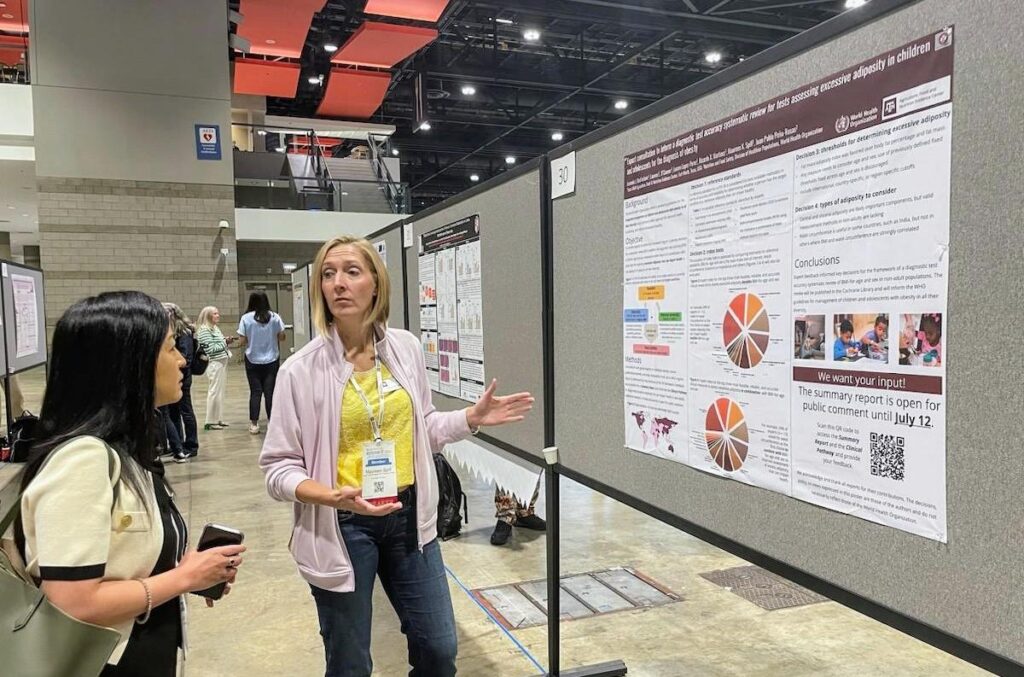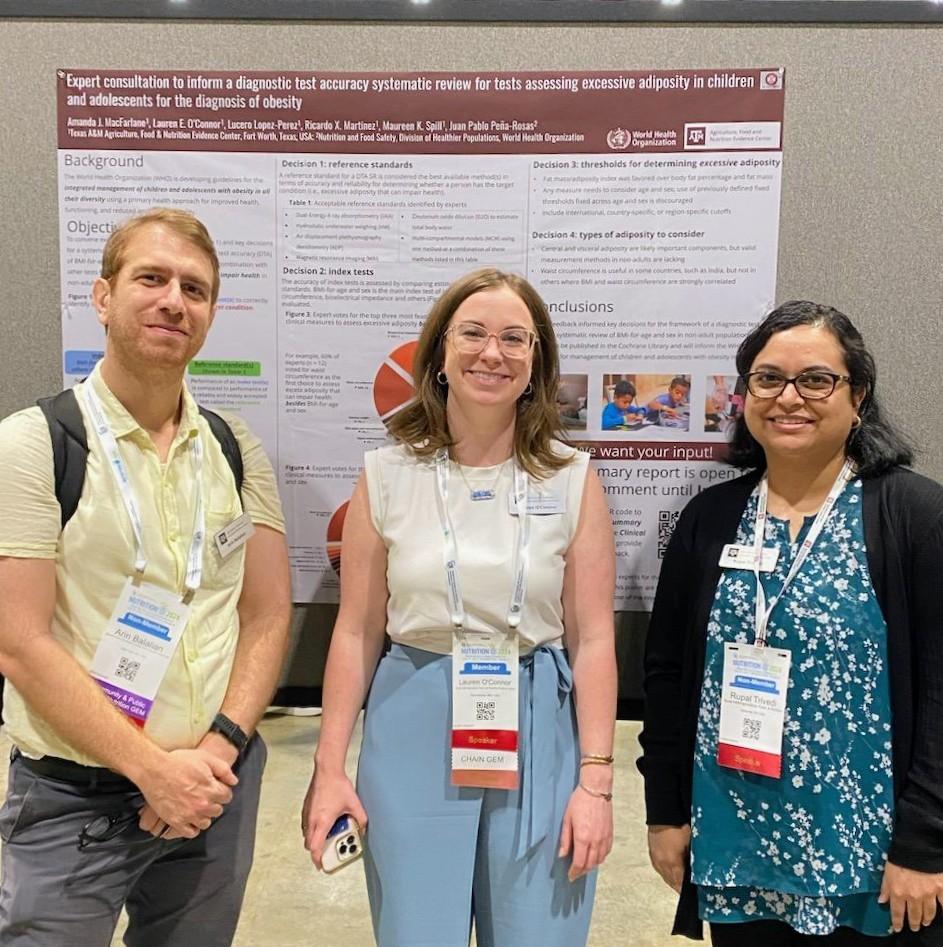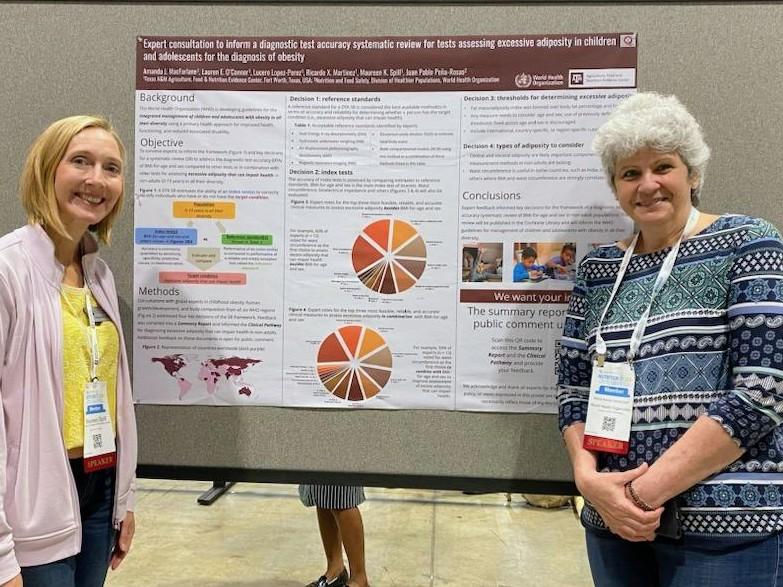Texas A&M Agriculture, Food and Nutrition Evidence Center debuts first suite of studies
Seafood-consumption assessments among scientists’ presentations at NUTRITION 2024
The Texas A&M Agriculture, Food and Nutrition Evidence Center presented its first suite of studies, funded by the National Academies of Sciences, Engineering, and Medicine, NASEM, at NUTRITION 2024, the American Society for Nutrition’s annual flagship meeting. The conference draws top nutrition scientists for research convenings, presentations and lectures.

Created in 2021, the Evidence Center’s mission is to produce transparent and reproducible evidence reviews and syntheses assessing the effectiveness of agri-food policies, practice and guidance related to agricultural, environmental, human and economic health.
Experts from the Evidence Center were selected to give five oral presentations based on research funded by NASEM, as well as two poster presentations based on other projects. This included a presentation by Maureen Spill, Ph.D., who was named the Evidence Center’s first associate director in May.
“The fact that the Evidence Center made its professional debut at NUTRITION 2024 is huge,” said Spill. “This conference is where the best nutrition scientists come together to drive scientific progress, which leads to better policies and improved human health. The Evidence Center team is proud to be among the forefront of that innovation.”
The suite of studies presented is a component of the National Academies of Sciences, Engineering and Medicine’s study examining the current scientific evidence on the relationship between seafood consumption and child growth and development. This review will focus on both maternal and child seafood intake and its impact on various developmental aspects. The objective is to gain the latest insights into the role of fish consumption within the context of a comprehensive diet.
The Evidence Center’s presented conclusions

The Evidence Center completed two complementary de novo systematic reviews, which assessed relationships between seafood consumption and neurocognitive development in children and adolescents. The first review assessed the relationships between seafood intake of mothers during pregnancy and lactation and neurocognitive development of the child. The results showed that seafood consumption during pregnancy may be favorably associated with behavior, attention and general development outcomes of the child.
The second systematic review assessed relationships between seafood consumption during childhood and adolescence and neurocognitive development. Seafood consumption, mainly as fatty fish, resulted in favorable cognitive development and behavior outcomes throughout childhood and adolescence. These results support previous research conducted at the U.S. Department of Agriculture to inform future dietary guidance about seafood intake during pregnancy.
Identifying benefits and risks of seafood in diets

While seafood consumption has nutritional benefits, it comes with risk for exposure to environmental contaminants. A scoping review assessed the volume of evidence examining seafood toxicant exposure during pregnancy, lactation and childhood and its relationship to childhood outcomes. They identified exposure and outcome pairs with sufficient evidence in multiple studies that may warrant systematic review and highlighted gaps in the existing research literature.
Based on the findings of the scoping review, a systematic review was conducted to examine the association between maternal lead exposure from seafood consumption and child neurodevelopment. Overall, the evidence did not suggest a detrimental impact of maternal lead exposure from seafood on child neurodevelopment, and seafood consumption was linked to improved neurodevelopmental scores overall. However, the limited number of studies calls for further research in diverse populations to enhance understanding of this association.
Mercury is a common contaminant of seafood with potentially adverse effects on child development. An umbrella review of existing systematic reviews looked at pre- and post-natal mercury exposure and childhood outcomes. More than 20 relevant systematic reviews were included and covered all child outcomes of interest identified by the NASEM committee except academic performance and failure to thrive. Multiple reviews addressed autism spectrum disorder, developmental domains and growth, most of which were rated as moderate to high quality.
Highest quality standards of evidence
In addition to the NASEM-funded studies, Evidence Center team members presented posters on its systematic review examining associations between universal free school meals and school and student outcomes. Poster presentations included a summary of an expert consultation regarding the accuracy of tests assessing excess adiposity in children and adolescents for the diagnosis of obesity in support of the World Health Organization’s guideline development for clinical management of children with obesity.
Amanda MacFarlane, Ph.D., director of the Evidence Center, said the team adheres to the highest standards when conducting their work. The Evidence Center fosters scientific rigor and transparency — the foundation for translating scientific evidence into reproducible, evidence-based solutions for improving public health.
“This opportunity to showcase our research with the top minds in nutrition science is incredible,” MacFarlane said. “The team’s findings will inform scientists, researchers and policymakers in the development of evidence-based dietary recommendations and identify topics that warrant further investigation, which in turn drives improvements in human health.”





